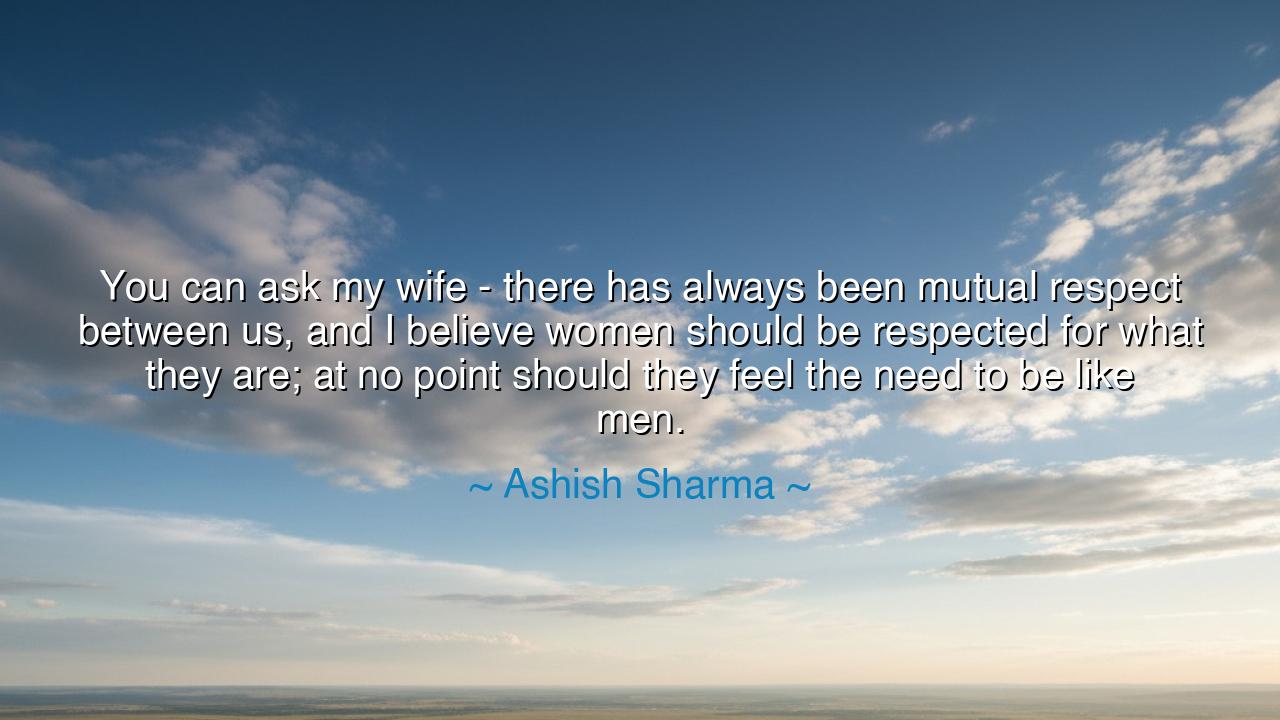
You can ask my wife - there has always been mutual respect
You can ask my wife - there has always been mutual respect between us, and I believe women should be respected for what they are; at no point should they feel the need to be like men.






Hear now, O seekers of truth, the words of Ashish Sharma, who declared with the quiet strength of conviction: “You can ask my wife—there has always been mutual respect between us, and I believe women should be respected for what they are; at no point should they feel the need to be like men.” In this utterance lies a principle as old as time itself: that the foundation of harmony between man and woman is not imitation, but mutual respect, not rivalry, but reverence.
The meaning of these words is profound. Too often, the world has weighed women not by their own essence, but by their ability to mirror men. Yet Sharma reminds us that a woman’s worth is not found in comparison, but in her own nature, her own gifts, her own sacred individuality. To demand that she be like a man is to deny her uniqueness; to honor her for who she is, is to celebrate the divine design that made her. Respect, therefore, is not in forcing sameness, but in cherishing difference.
Consider, O children of wisdom, the tale of Queen Hatshepsut of Egypt, who ruled a mighty kingdom thousands of years ago. Though the traditions of her time demanded that power be clothed in the likeness of men, she did not abandon her womanhood, nor did she disguise her wisdom. She adorned herself as Pharaoh, but governed with a distinctly feminine strength—marked by diplomacy, prosperity, and the building of monuments that endured. Her reign proves the ancient truth: women do not need to become men to wield greatness; they need only to be respected for the power already within them.
The origin of Sharma’s words lies in the sacred bond of marriage, where two souls stand as equals, different in form and function, yet united in dignity. He speaks not in abstract philosophy, but from the living testimony of his own home: mutual respect between husband and wife. In this small circle of family lies the seed of a greater truth: if respect is practiced in the home, it can flourish in the world; but if it is absent in the home, all society will suffer. Thus, the family becomes the first temple of equality, where both man and woman are honored.
Let us not mistake these words as weakness or indulgence. No, to respect women for what they are is not to confine them, but to release them. It is to say that they need not prove their worth by imitation, nor justify their dignity by competition. Their worth is innate, their dignity unquestionable. And in this truth lies the strength of a society, for no people can rise higher than the respect they grant their women.
The lesson for us is luminous: let every man learn to honor woman not as a shadow of himself, but as a radiant being in her own right. Let every woman remember that she does not need to shape herself into the likeness of men to command respect—her very being already demands it. Together, when men and women stand in mutual reverence, then marriages thrive, families are strengthened, and nations endure.
Practical actions flow from this teaching: in the home, let husbands and wives cultivate mutual respect through word and deed, sharing burdens and celebrating differences. In the workplace, let men honor the insights of women not as imitations of masculine thought, but as contributions springing from their own wisdom. And in society, let laws and customs rise to reflect that women are not secondary, not copies, but equals in dignity. Respect them for what they are, and the world will be healed of many of its wounds.
Thus, O heirs of tomorrow, hold fast to Sharma’s counsel. Let respect be the bond between man and woman, not competition nor comparison. For when women no longer feel the need to be like men, and men rejoice in women as they are, the harmony of creation is restored. And in that harmony, families flourish, societies prosper, and humanity walks nearer to the divine. Honor women, and you honor the sacred order of life itself.






AAdministratorAdministrator
Welcome, honored guests. Please leave a comment, we will respond soon